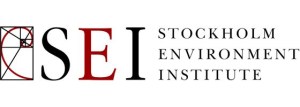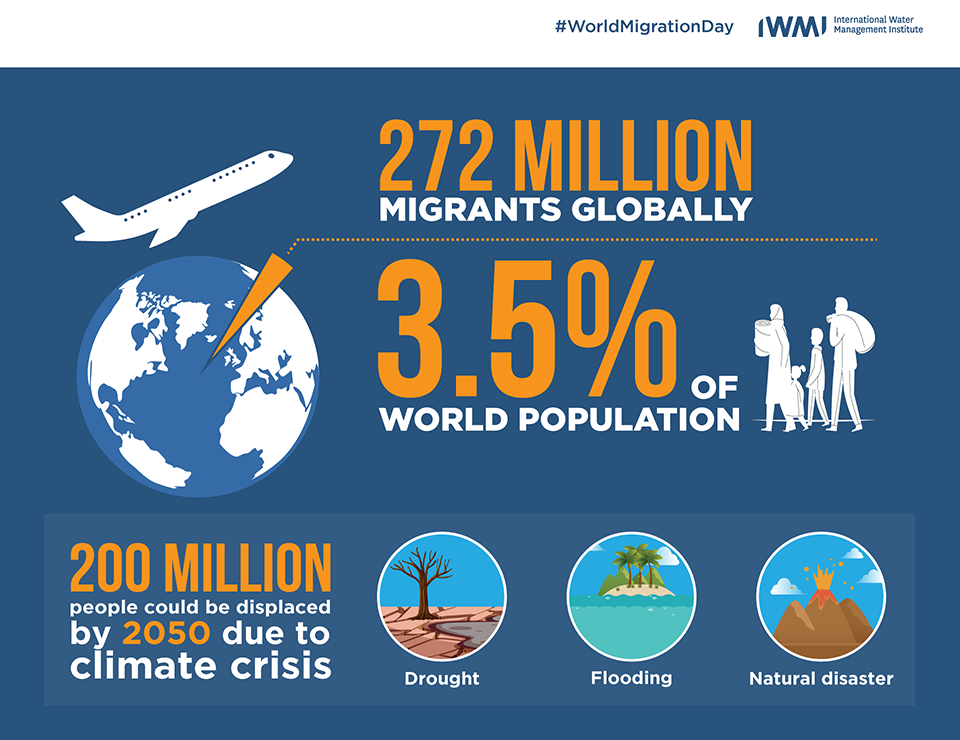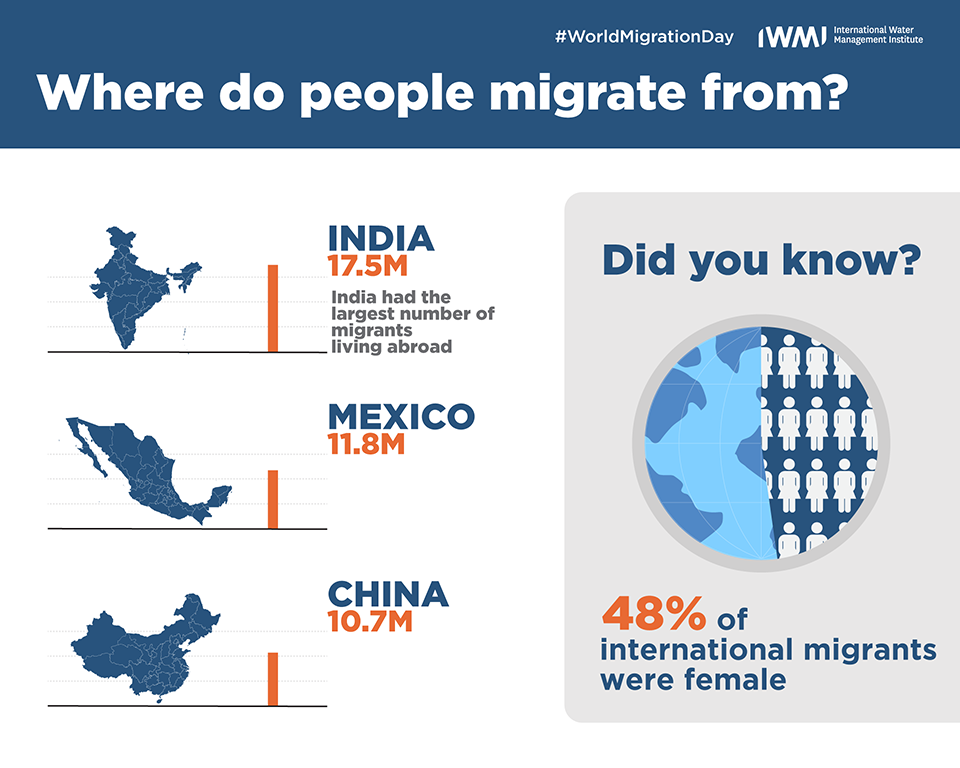Migration, Water & Agriculture
Migration is transforming rural communities as people move in search of new employment opportunities and livelihoods. There are an estimated 272 million migrants globally, making up 3.5% of the world’s population, and nearly two-thirds are labor migrants. Understanding the factors which push people away from home communities and pull them to new towns, cities and countries can help in understanding trends in rural transformation. For instance, water stress and agricultural livelihoods can be a factor in migration decisions, suggesting an important role for water governance in migration policy making. At the same time, however, migration decisions are linked to complex socio-economic, political and environmental factors, many of which go far beyond the availability of and access to natural resources. Moreover, migration varies considerably in type – some movement can be internal – within a country— or international; and those who move may do so seasonally, for part of the year, or over the long-term. Some, indeed, are permanent.
IWMI takes a ‘positive migration’ approach where migration is not ‘problematized,’ but rather seen as an adaptation technique in response to climate variability, economic stress, socio-political factors and personal aspirations. Our work focuses on five areas which aim to understand migration patterns, build resilience for migrant and home communities and develop policies to improve governance and facilitate safe, orderly and regular migration. All the focus areas contribute to the broader ambitions of a unified One CGIAR delivering an ambitious Research and Innovation Strategy. Our goal is to build resilient, food secure migrant and home communities focused on reducing poverty, adapting to climate variability, improving livelihood opportunities and enhancing social inclusion.
Click on the icons on the right to find out more or browse the resources below.
Focus Areas
[sg_popup id=”45111″ event=”click”] Economics and equity[/sg_popup]
Economics and equity[/sg_popup]
[sg_popup id=”45117″ event=”click”] Urban & rural transformation[/sg_popup]
Urban & rural transformation[/sg_popup]
[sg_popup id=”45124″ event=”click”]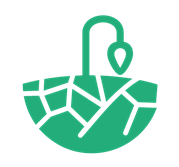 Covid-19 disruption & adaptation[/sg_popup]
Covid-19 disruption & adaptation[/sg_popup]
[sg_popup id=”45127″ event=”click”]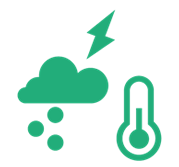 Water, climate change and agrarian stress[/sg_popup]
Water, climate change and agrarian stress[/sg_popup]
[sg_popup id=”45130″ event=”click”]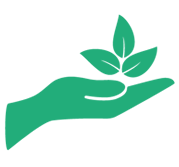 Gender, intersectionality and social inclusion[/sg_popup]
Gender, intersectionality and social inclusion[/sg_popup]
Highlights
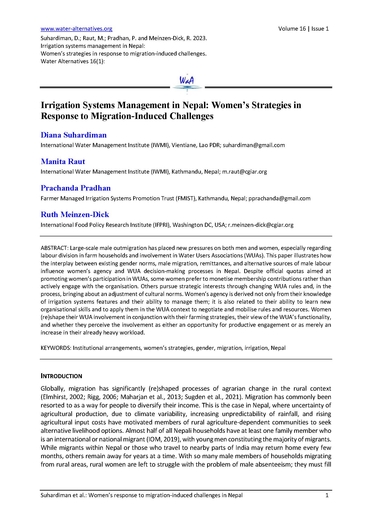
Water Alternatives, 2023
More... | Fulltext (418 KB)
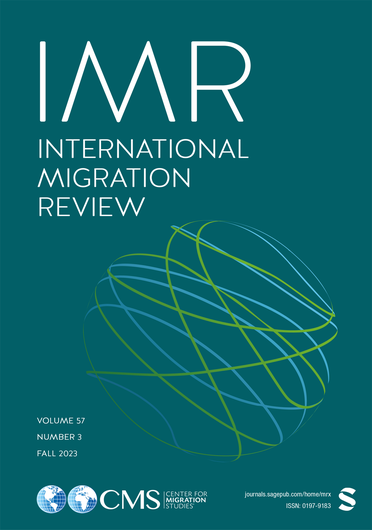
International Migration Review, 2023
More... [DOI] | Fulltext (283 KB)
![Migration and its two-way relationship with rural change: lessons from China, Ethiopia, Moldova, Nepal, Kyrgyzstan, Morocco and Thailand. [Policy Brief of the Migration Governance and Agricultural and Rural Change (AGRUMIG) Project] (09/30/2023) Migration and its two-way relationship with rural change: lessons from China, Ethiopia, Moldova, Nepal, Kyrgyzstan, Morocco and Thailand. [Policy Brief of the Migration Governance and Agricultural and Rural Change (AGRUMIG) Project] (09/30/2023)](https://publications.iwmi.org/TN/H052213.jpg)
2023
More... | Fulltext (6.16 MB)
![Thailand overview. [Policy Brief of the Migration Governance and Agricultural and Rural Change (AGRUMIG) Project] (09/30/2023) Thailand overview. [Policy Brief of the Migration Governance and Agricultural and Rural Change (AGRUMIG) Project] (09/30/2023)](https://publications.iwmi.org/TN/H052214.jpg)
2023
More... | Fulltext (8.74 MB)
| Name | Role/expertise | Country |
| Alan Nicol | Strategic Program Director – Water, Growth and Inclusion: Research on water and development in Asia and Africa, with a particular focus on political economy, rural water development and transboundary river basin management. | Ethiopia |
| Indika Arulingam | Research Officer (Social Scientist); focus on youth livelihoods in Myanmar | Sri Lanka |
| Manita Raut | Senior Research Officer: Inclusive water management, collective farming approaches, feminization of agriculture, agricultural technology adoption, ground water governance, inclusive WASH | Nepal |
| Esther Wahabu | Researcher: Focus on Water, Gender, Climate Resilience and Migration Research | Ghana |
| Charity Osei-Amponsah | Regional Researcher – Social Transformation: Social transformation and rural development, governance and policy analysis and advocacy, institutional and political economy analysis, innovation systems and agricultural partnerships | Ghana |
| Mengistu Debela | Research Officer | Ethiopia |



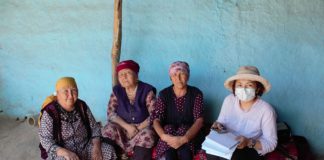
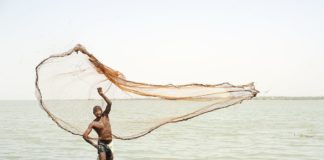
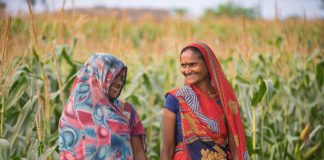
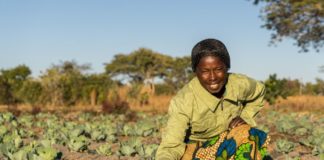
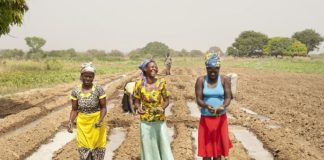
![Outmigration and labor mobility issues and policies in Nepal. [Policy Brief of the Migration Governance and Agricultural and Rural Change (AGRUMIG) Project] (09/30/2023) Outmigration and labor mobility issues and policies in Nepal. [Policy Brief of the Migration Governance and Agricultural and Rural Change (AGRUMIG) Project] (09/30/2023)](https://publications.iwmi.org/TN/H052211.jpg)
![Outmigration and labor mobility issues in Moldova. [Policy Brief of the Migration Governance and Agricultural and Rural Change (AGRUMIG) Project] (09/30/2023) Outmigration and labor mobility issues in Moldova. [Policy Brief of the Migration Governance and Agricultural and Rural Change (AGRUMIG) Project] (09/30/2023)](https://publications.iwmi.org/TN/H052215.jpg)



